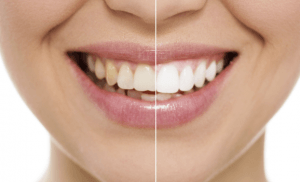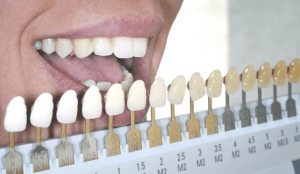Having a white a bright smile can really impact your confidence. After all, your smile is the first thing that others notice about you. However, aging has a way of changing the appearance of our smiles. Many people notice that their smiles lose their luster and appeal as their teeth turn dark and yellow. There are different reasons why our teeth turn yellow as we age. Here are some examples of the most common reasons why teeth change color over time:

Our teeth turn yellow as we age for many different reasons
Plaque & Tartar Buildup
Your teeth may appear dark and stained simply because there is too much plaque buildup on them. A simple dental cleaning removes this buildup to fix your problem giving you a whiter and brighter smile in no time. If you haven't seen a dentist in a long time, getting a dental cleaning should be your first step towards achieving a whiter smile.
Tobacco Products
Nicotine, cigarette tar, and other tobacco products stain teeth heavily and turn them yellow. The longer you've been smoking, the darker and yellower your teeth will appear. Quit smoking today, and watch your pearly whites become pearly whites again!
Foods & Drinks That Stain Teeth
Many food and drink items contain additives that stain and darken your teeth. Examples include:
- Coffee
- Tea
- Red wine
- Colas
- Fruit juices
- Berries
- Most spices
- Food adaptive
Acids
Acid destroys the tooth enamel which exposes the much darker tooth layer underneath. This results in permanently yellower teeth that can not be whitened! What are the most common acids that we consume? Carbonated sodas, fruit juices, and most energy drinks contain acids that destroy your tooth enamel over time. If you can’t kick your soda habit, then make up for it by brushing your teeth more frequently and drinking plenty of water to wash away the acids. Acids can also be found in your stomach juices. This acid is very corrosive and wears out teeth quite rapidly. Frequent regurgitation, as evidenced in bulimia and those suffering from acid reflux, can destroy the tooth enamel at an accelerated rate. Again, this exposes your inner tooth layers which turn your smile into a yellow one. Be sure to brush and clean your teeth thoroughly after any regurgitation episode so that your teeth are not exposed to stomach acids for prolonged periods.
Clenching & Grinding
Grinding your teeth is a destructive habit that damages your teeth. Heavy teeth grinders wear away their tooth enamel to expose the underlying tooth structure. Not only does this damage your teeth, but it also makes them appear darker and yellower as well.
Aging
Lastly, your teeth can turn yellow due to wear and tear. Aging causes us to lose some of the protective enamel layers. This makes your teeth appear yellower and worn out.
Am I a good candidate for tooth whitening?
You are a good candidate for teeth whitening if your teeth have turned yellow as a result of coffee, tea, red wine, etc. The whitening gel will penetrate your teeth' surfaces to break down internal stains. This will significantly brighten and whiten your smile. There are many different ways to whiten your smile including take-home custom trays, whitening toothpastes, Crest Whitestrips, or receiving a professional teeth whitening from your dentist. Consult with your dentist to find out if you're a good candidate for teeth whitening treatment.

If your teeth have turned yellow as a result of food stains then you're a good candidate for teeth whitening treatment
When am I NOT a good candidate for tooth whitening?
Be sure to always consult with your dentist to determine if you're a good candidate for teeth whitening treatment. If your teeth have turned yellow for any reason other than internal staining, then they will not respond well to whitening treatment. Teeth that are yellow as a result of damage to the enamel will not react well to bleaching products. Here are examples of cases that don't respond well to typical whitening treatment:
Loss of the enamel layer
Teeth whitening isn't going to work if your teeth are yellow due to the loss of the protective enamel layer. There are plenty of reasons why you would lose your tooth enamel, including:
- Prolonged exposure to acidic products
- Teeth grinding
- Wear and tear as a result of aging
These cases are not good candidates for teeth whitening treatment. Teeth whitening will not restore your tooth damage, and it will not whiten your teeth. In fact, trying to bleach teeth that are already damaged can make them very sensitive and even painful. If you want whiter teeth, you should look into cosmetic dentistry treatments, particularly dental bonding or porcelain veneers.
Plenty of existing dental work in your mouth
Teeth whitening doesn’t alter the color of existing dental restorations. This means that your fillings and crowns won't change their color after you bleach them. If your mouth contains lots of existing dental work, especially on the front teeth, you should consult with a dentist prior to bleaching them. Otherwise, you could end up with a mismatch between your natural teeth and those with a dental restoration on them!
Dirty teeth
Your teeth appear yellow when they're covered with plaque and tartar. A professional dental cleaning removes these stains to significantly whiten your smile. If you haven't had a good cleaning in a while, that's the first thing you should do before whitening your teeth. The bleaching gel will not work properly if your teeth are covered in food and bacteria. Just be sure to improve your brushing and flossing habits to maintain the bleaching results.
0 Comments